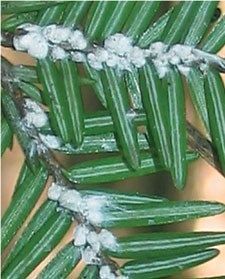NotMISpecies Webinar: Hemlock Wooly Adelgid
On Friday, January 22nd, I attended a fascinating installment of the NotMISpecies Webinar series. This series is being put on by the Michigan Invasive Species Program, an effort coordinated between the Department of Environment, Great Lakes, and Energy (EGLE), Department of Natural Resources(MDNR) and the Department of Agriculture and Rural Development(MDARD). The most recent webinar focused on Hemlock Woolly Adelgid, more commonly referred to as HWA, its introduction, spread and the current management practices within Michigan.

Photo is from an article about Hemlock Wooly Adelgid by the National Parks Service.
It is important to note the definition of an invasive species. According to the State of Michigan, “An invasive species is one that is not native and whose introduction causes harm or is likely to cause harm to Michigan’s economy, environment, or human health.” HWA is most certainly a threat to the roughly 170 million Eastern Hemlock trees in Michigan. But thankfully, there is a committed effort to manage it before it becomes a large problem, and this webinar mentioned many of the current partnerships in place to maintain. HWA is currently in five Michigan Counties, and management requires collaboration between many partners and private landowners. Click here to learn how to correctly identify Hemlock Woolly Adelgid as well as learn more about the current news regarding the management. To view the recording of the HWA NotMISpecies webinar click here.
As many MUCC members already know, managing invasive species is critical to ensuring healthy habitat for Michigan’s game and non-game species. MUCC’s field team has done numerous volunteer events focused on removing species like garlic mustard, spotted knapweed, European frogbit, etc. Click here to learn about upcoming opportunities to volunteer with the MUCC field team.
The next installment of the NotMISpecies series will be on February 16th at 9:00 AM. It is focused on boating and aquatic invasive species, and you can register to attend by following this link.
The post NotMISpecies Webinar: Hemlock Wooly Adelgid appeared first on Michigan United Conservation Clubs.
Recent Posts



